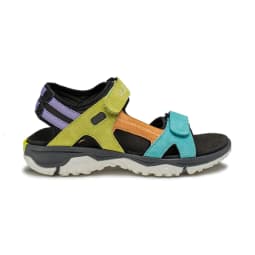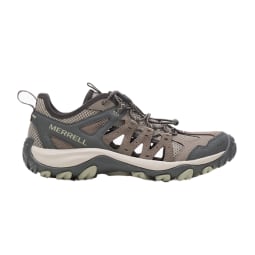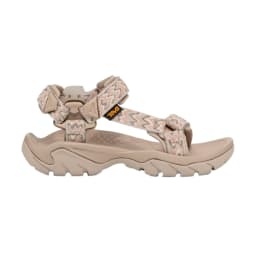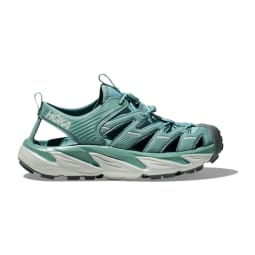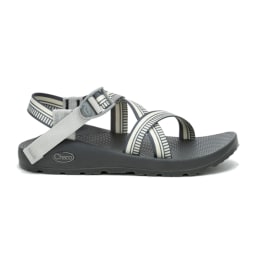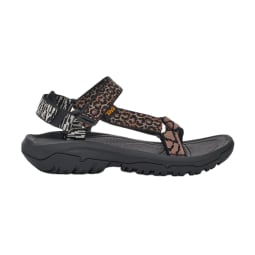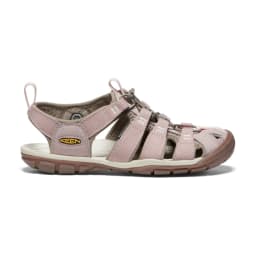The 7 Best Hiking Sandals Of 2023 + How To Choose, With Recommendations From Podiatrists

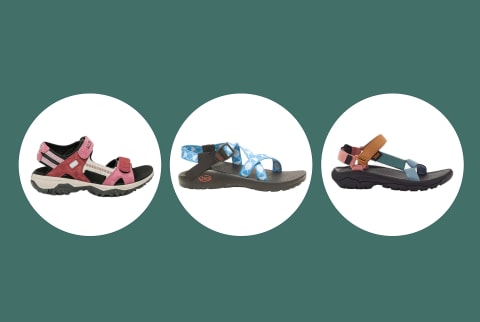
- Best for plantar fasciitis: Kuru Tread Sandal
- Best closed-toe: Merrell Accentor 3 Sieve
- Best for travel: Teva Terra Fi 5 Universal
- Best arch support: HOKA Hopara
- Best for daily wear: Chaco Z/1 Classic
- Best fitting: Teva Hurricane XLT2
- Best waterproof: KEEN Clearwater CNX
Whether you're a seasoned hiker or just learning about the benefits of time in nature, you'll want to take stock of your footwear. While a solid pair of hiking boots is key, the best hiking sandals are essential for any warm-weather hike (especially those involving lakes, streams, or rivers).
Hiking sandals provide the same sturdy support and grip as boots while giving your toes the space to breathe. After all, wet feet plus too much friction equals blisters—and blisters are sure to ruin any hike.
What are hiking sandals?
Hiking sandals are shoes designed specifically for hiking in hot, wet climates. They typically feature water-resistant materials; grippy, rubber outsoles; and quick-drying insoles.
For safety and health purposes, it's important not to hike in walking shoes. "Since hiking is completely different from walking, there are certain demands placed upon the feet and legs that we may not normally experience—like dealing with uneven surfaces, inclines, and declines," explains podiatrist Robert Kornfeld.
"It's important to have hiking shoes that protect against impact (whether that be the action of jumping from low or high ledges, walking through slippery dirt, and potentially losing your footing on small movable rocks), keep debris out of the shoe, and can support the feet while they are placed under these stresses," he adds.
How hiking impacts longevity
One 2023 study showed that hiking and time spent in nature has a tremendous impact on longevity and mental health1. What's more, people who live closer to green spaces tend to live longer2 and have fewer health concerns.
Time spent in nature can even help you cope better with life's stressors3, contributing to better health overall.
Studies out of Japan4 indicate that invisible chemicals (called phytoncides) in some trees can reduce stress hormones, lower anxiety, and improve blood pressure and immunity—all things our bodies need to thrive.
Another added bonus: Time spent in sunlight offers health-boosting vitamin D and stabilization of melatonin levels, both of which are impacted by too much time inside and on screens.
What to look for in hiking sandals
When considering which shoe is best for you, keep in mind your foot type (either narrow or wide), how much walking you'll be doing when wearing them, and the type of ground you'll be standing on. Consider the following podiatrist-backed parameters before picking a pair:
- Fit: According to surgical podiatrist Nelya Lobkova, the fit should be snug yet roomy around the toes to allow for some minimal movement in the hiking shoe.
- Weight: "The weight of a hiking shoe should be greater than a walking or running shoe, around 14 oz.," Lobkova explains. "This accounts for mid-level ankle support and a lug rubber sole."
- Durability and materials: The midsole should be stable and supportive yet flexible at the big toe joint to allow for balance, as a lot of our lower-extremity balance comes from stabilizing the big toe, Lobkova explains. "The outsole should be rubber to allow for good traction."
- Waterproof ability: The waterproof ability comes from the upper material. Per Lobkova, this should be GORE-TEX, in order to prevent any moisture or water from entering the shoe—even if the shoe is submerged in water.
How to choose the best hiking sandals
When choosing the best hiking sandals for you, it's best to try on multiple options and decide which feel most comfortable for you. That's why we chose options from brands with generous return policies. Take extra notice of whether or not a shoe offers support, shock absorption, and a durable, nonslip outsole.
To narrow things down before the try-on stage, consider your budget, the shoe's materials, durability, your style preference, and feedback from reviewers.
Our picks of the best hiking sandals of 2023:
Pros:
- Designed with heel pain in mind
- Ultra-supportive
- Excellent grip strength
Cons:
- Not the cutest option on this list
Materials:
Waterproof leatherRubberSizes available:
5-12Colorways:
5, including Multicolor, Merlot Almond, and moreBest for:
Heel painReturn policy:
45 daysClosure:
Velcro strapsWhen you have plantar fasciitis, it’s essential to seek out an ultra-supportive pair of sandals. Enter: This pick designed with unmatched heel support and a responsive heel-cushioning technology that protects your feet from impact with each step.
A curved, heel-cupping design keeps your feet comfortable throughout every adventure. The sandal also has loads of traction, thanks to multi-directional lugs. Rugged, waterproof leather and durable rubber come together to form a sandal that fights foot pain one mile at a time.
Customers say this sandal is lightweight, supportive, and incredibly comfortable. Reviewers with wide feet in particular love the fit.
Pros:
- Breathable
- Protective construction
- Water-friendly
Cons:
- Not too many style variations
Materials:
EVA foam insoleWaterproof suedeMesh upperMesh liningSizes available:
5-15Colorways:
4, including Monument and BrindleBest for:
Challenging hikesReturn policy:
30 daysClosure:
Slip-onEvery expert we spoke to recommended closed-toe shoes for most hiking situations. “I like closed-toe [hiking sandals] the most because we have to protect our feet from dangerous terrain,” Lobkova explains.
Lobkova and Kornfeld both recommended several Merrell options, noting that they’re among the best when it comes to cushioning and support. This versatile, breathable hiking sandal features the brand’s signature grippy rubber soles that offer traction and stability, while the insoles cradle the feet for all-day comfort while on the trail.
Despite having a closed toe, these sandals have openings along the sides to ensure breathability and comfort. Plenty of happy customers agree, too, with one explaining that these shoes kept her feet cool during hot summer hikes.
Advertisement
Pros:
- Quick-drying
- Comfortable contoured footbed
- Rugged slip-resistant rubber sole
Cons:
- Reviews note that debris can get stuck in the straps
Materials:
100% recycled plastic upperRubber soleSizes available:
5-11Colorways:
Varied, depending on the retailerBest for:
Long hiking tripsReturn policy:
30 daysClosure:
Velcro strapsThe sportier version of the brand's classic design, this pick features a soft and comfortable footbed that contours around the shape of the feet, as well as rugged slip-resistant rubber soles. Classic velcro straps keep the foot in place, making these sandals just as comfortable in water as on land.
It’s worth noting that the shoe is made with a lightweight, breathable polyester mesh that keeps feet cool, even during long hikes with heavy backpacks. Also nice: These hiking sandals are treated with Life Naturals, a natural peppermint-based antimicrobial that fights the growth of odor-causing bacteria.
The sandal has garnered hundreds of positive reviews, including from shoppers with high arches—one of which says she's "sold for life."Another with chronic back issues explains that thanks to the excellent footbed, she feels supported on concrete, gravel, or dirt roads.
Pros:
- Unisex
- Good for hiking
- Low-profile cushion
Cons:
- Bulky
Materials:
Rubberized EVANeopreneSizes available:
5-15Colorways:
7, including Limestone, White, and moreBest for:
All-terrain hikes, water-crossings, stabilityReturn policy:
30 daysClosure:
Slip-onAn ideal pick for arch support, these sandals were featured as best for outdoor activities in our roundup of best arch support sandals. They combine the best part of Hoka sneakers: unparalleled traction, loads of support, and funky modern design.
The style, which comes highly recommended by Loboka, offers everything you’d ever need from a hiking sandal: a water-friendly construction ideal for water-crossing and unexpected puddles, a tread for extra grip, and a load of responsive cushioning.
A toe cap protects feet from the elements you’re bound to face out in the wild, while the quick-lace design makes it easy to slip shoes on and off for campground hangs and quick dips. Best of all, the low-profile cushion bed offers support while still keeping your feet close to the ground for stability.
Advertisement
Pros:
- Podiatrist-accepted footbed
- Grippy rubber tread
- Lightweight
Cons:
- Not for long hikes
Materials:
Polyester webbingLUVSEAT footbedRubberSizes available:
5-12Colorways:
23, including Curry, Earth Gray, and moreBest for:
All day wearReturn policy:
30 daysClosure:
Adjustable strapsThis list wouldn’t be complete without a pick from Chaco. Selected as the best sandal in our best hiking shoes roundup, the Z/1 Classic model is durable (thanks to the brand’s signature ChacoGrip™ rubber) and great for when you need a high-performing grip on a wet surface.
Plus, the footbed is podiatrist-accepted, so you can expect all-day comfort and support during your adventures. Reviewers say these sandals are super easy to adjust, offering the perfect fit whether their feet are swollen from the heat or cold and wet after hiking through water. Others note the high quality material and how comfortable they are to walk in.
Pros:
- Pretty colorways and patterns
- Narrow strap and wide strap variations available
Cons:
- Not the most most supportive on this list
Materials:
Recycled PET polyesterNylon strapsSizes available:
5-14Colorways:
9, including Basil, Black, and moreBest for:
Light hikingPost-hike activitiesReturn policy:
30 daysClosure:
Velcro strapsA true classic when it comes to open-toed, active sandals, the Teva Hurricane XLT2 sandals are a great choice for light hikes, cooling off in rivers and lakes, and any other post-hike adventures you might find yourself in. Four adjustable straps ensure a perfect fit, while the soft EVA midsole brings gentle support.
These sandals don’t have a toe post, but feet stay in place thanks to grooves in the sole of the shoe. When wet, the shoes dry quickly, effectively preventing chafing-induced blisters and sores. You can expect great traction, too, which is especially helpful if you’ll need some grip support after submerging your feet.
Plenty of happy shoppers give rave reviews of this model, including a customer who comfortably wore their last pair for 25 years before giving in and purchasing a replacement.
Advertisement
Pros:
- Neutral colorways
- Anti-odor
Cons:
- Size availability is inconsistent
Materials:
Polyester upperEVA insoleRubber outsoleSizes available:
5-11Colorways:
3, including Timberwolf/Fawn, Navy, and BlackBest for:
In, on, or near waterReturn policy:
30 daysClosure:
Slip-onDuring my (the writer's) recent trip to Acadia National Park, I needed a pair of hiking sandals that could handle the rocky beaches, hours of being lapped with rogue waves, and the occasional docking and exploring random little islands along the Mount Desert Narrows.
Thankfully, I packed a pair of these hiking sandals and never once felt unsteady or unsupported. In fact, I reveled at how quickly they dried after being fully submerged in water and how lightweight they felt when climbing up boulders or trudging through the sand.
For such a weightless shoe, I was impressed by how strong the outsole’s grip was and the fact that the non-marking rubber was footprint-free, effectively leaving each place I visited just as beautiful as it was before I got there.
How we picked:
Quality
Quality is key, especially when you'll be using shoes in potentially dangerous situations like hiking the side of mountains, crossing streams, and more. We chose shoes made from high-quality materials that will stand the test of time (and nature).
Expert insight
The hiking sandals on our list fit the criteria outlined by the podiatrists we interviewed. We considered foot health and kept comfort top of mind. Each shoe has a durable sole and sturdy structure.
Reviews
We took customer reviews into consideration when selecting hiking sandals. Many of the styles on our list have five-star reviews from the people who have tried them and wear them on a wide range of outdoor adventures.
Materials
Materials can make or break the experience with the shoe. We considered fabrics and types of material used in each shoe to ensure comfortable, blister-free wear.
FAQ:
Are Tevas actually good for hiking?
A popular option for hikers, Tevas are the sandals most people think of when they think of hiking sandals. They're durable, comfortable, and dry quickly after getting wet, making them a great choice for people who need to go from land to water and back again easily and comfortably.
Which is better for hiking: shoes or sandals?
According to Kornfeld, closed-toed hiking shoes are recommended for challenging hikes on mountain trails. "It is far too easy to injure toes in an open-toed shoe as you walk by fallen branches and twigs or climb up boulders and rocky mountain terrain," he explains. "Plus, they protect against bug bites and keep debris from entering the shoe."
However, both Kornfeld and Lobkova agree that if you're walking through wet, paved, or flat areas, you can most definitely use open-toed hiking sandals.
"For cold weather, choose a closed-toe shoe. For very hot or water/river hiking, sandals can be used," Lobkova adds.
Are Crocs sandals good for hiking?
It's not recommended to walk long distances in Crocs, especially on uneven ground—and that includes hiking trails. They won't provide your feet with the support you need, and you'll likely feel sore—if you don't injure yourself in the process. Instead, opt for a tried-and-true hiking shoe or sandal.
What type of footwear is best for hiking?
It is important to have the right footwear for hiking, depending on the terrain. "Hiking in the city? Opt for supportive lightweight shoes. Hiking on sand or soil? Opt for low-cushioned sneakers. Hiking on rocky mountains? Opt for a flexible shoe with a thick rubber outsole, like a climbing shoe," advises Lobkova.
When in doubt, Kornfeld recommends hiking shoes designed with a semi-firm sole (not rigid but not overly flexible, he says) with adequate impact cushioning and a high-top upper sole for ankle support. "If hiking trails won't be too challenging, a low-top style is just fine."
He adds that if you'll be in wet, paved, or flat terrain, hiking sandals are a good option.
The takeaway
If your next hiking adventure involves crossing streams or getting in and out of a kayak or boat, you won't regret investing in a pair of hiking sandals. These lightweight, breathable sandals are easy on sore feet and blisters and ideal for hot climates. Before embarking on your next trip, be sure to check out our list of the best hiking boots, as well as a whole slew of sustainable backpacks.
Meet The Experts
4 Sources
- https://www.ncbi.nlm.nih.gov/pmc/articles/PMC9859399/
- https://www.ncbi.nlm.nih.gov/pmc/articles/PMC5642810/
- https://www.ncbi.nlm.nih.gov/pmc/articles/PMC3799530/
- https://link.springer.com/?utm_medium=affiliate&utm_source=commission_junction&CJEVENT=1a9db3d846d311ee80aedab40a82b82d&utm_campaign=CONR_BOOKS_ECOM_GL_PHSS_ALWYS_DEEPLINK&utm_content=textlink&utm_term=PID100064639&?utm_medium=affiliate
